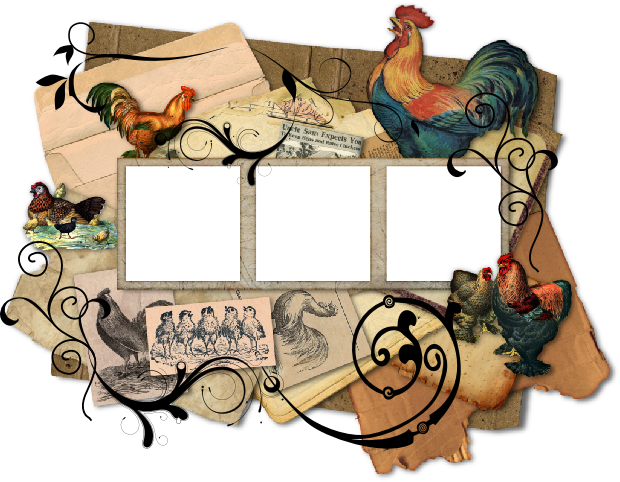
There’s no denying it–chickens are flippin’ flappin’ weird. And you are about to become one, congrats.
Chickens, as with most birds, possess the emotional and intelligence level of a 2
year old human child. Chickens feel emotions on that level including jealousy, fear,
affection and sadness, among others. If you are going to be closely involved in
your flock of chickens and not just keep them as barnyard animals, be prepared to
be regarded as a member of the flock, and also be prepared to take and maintain the
Head Roo position-
Here, for example, is my flock’s reaction to my coming out one day after I’d finished mowing the lawn and had bits of cut grass stuck to my shoes–I was a walking chicken treat. My job was to be a beneficent God and gently stop any bullying that went on, but otherwise I just sat and let whomever would approach, approach. The reward for being friendly to humans in this case was FOOD, of course, which is a thing near and dear to every chicken heart. I didn’t chase anyone around and force them to participate, I just waited and let the less friendly birds see that by not getting in there, they were missing out.
This is the way to change chicken minds and encourage wary birds to learn to love and trust you.
Behavior & Psychology
THE FLOCK DYNAMIC
WHY AND WHERE YOU FIT IN AS CHICKEN GOD
AND THE WEIRD THINGS CHICKENS DO

Velvet Sparrow
In the absence of a rooster, you may discover that one of your hens-
I have noticed some interesting differences in small flocks (3 to 8 birds) versus
larger flocks (20 to 40 birds). Small flocks tend to be more tightly knit and laid
back, with less fighting and more sharing of food. Larger flocks tend to be the opposite,
with more 'cliques' within the pecking order, which is more rigidly enforced also.
ALL chickens are lovers of routine and order, however. If you break your regular
routine in some small way with your chickens-
By the way, chickens don't know from vacations to Hawaii. To a chicken, you gone = you DEAD and gone, forever. Chickens can, do and will mourn your 'loss' and may even seem depressed, stop or reduce eating, etc. Don't be surprised if you check in with the neighbor who is tending your flock while you are away and he reports this kind of behavior. Sometimes it helps to have the neighbor come over a time or two before you leave, and you both hand out goodies together to get your flock used to another person. This is a help because most chickens do not like strangers and will run from them.
When you return they will be joyous at first and run to you begging for attention-
Every so often there will be a small squabble if one of the lower birds gets too
big for her britches or tries to move up in the order. There can also be a reshuffling
of the pecking order when a pullet comes into lay and attains Egg Laying Hen status,
or when a hen goes broody and attains Broody Hen status (everyone just plain RUNS
from her). If you keep your birds long enough and have more than one rooster, there
can also be the sad day when your long-
The Head Roo and Head Hen eat first, can run anyone else out of a dust bath and take
it over, etc. They peck everyone else and no one pecks them. The Head Roo does most
or all of the mating duties and will chase off the lower roos when they try to mate.
Experienced roos tend to mate only the Head Hen and the hens that are in lay–youngsters
not in lay yet and old ladies that have fallen out of lay are left alone. Youngsters
roos have not learned to properly discern which are which yet though, and can cause
general outrage and commotion when they run about blindly grabbing and mating hens.
Remember in your flock that YOU are the Head Roo and/or Head Hen-
Sometimes roosters will cautiously greet each other (or you) with direct eye contact and a slow, languid flap or "wave" or their wings. The Lesser or Beta Roos wave first at the Head or Alpha Roo. This is a way of saying, "Hi, I'm friendly and mean you no harm, please don't kick my butt!" Some hens will do this as well. If a hen is feeling especially perky, she'll stand on her tiptoes and greet you with a faster flap of the wings, but the primary flight feathers actually make a 'clacking' sound as she whacks her wings together over her back. Kind of like a human clapping their hands.
Chickens have a social hierarchy called ‘the pecking order’ that is vigorously maintained.
In the pecking order, there is usually the Head Rooster (YOU!), then the actual
rooster Head Roo, the Head Hen, then the Beta or secondary roo, HIS Beta Head Hen
and so on down the line. The birds will work out the pecking order themselves, and
every time you add new birds to the mix the new birds will have to spend a certain
amount of time getting pecked, sometimes just ceremoniously, by the birds that are
above them in the hierarchy. One of your jobs as Head Roo is to put a quick end to
any excessive bullying-
The friendly hen that comes up to you, stands on your foot with her chest against
your shin and gently pecks and tugs at your pants' leg isn't being mean, however-
Your chickens trust you not to hurt them, and can do some pretty daffy things because of this. They won’t move out of the way when you walk by, they’ll run between your feet while you are carrying something across the yard, etc. One day I was sitting in a chair out in the yard, petting one of the hens while she sat in my lap, other hens circling and waiting their turn–this was a Brahma hen and took up my entire lap, so no room at the inn for others while she was there. When I bent over to put her back down on the ground, another hen decided she’d get a jump on the competition and leapt for my lap…well, I was leaning over. So yeah, I pretty much took a pullet to the head.
Your chickens competing for your attention may remind you of preschoolers fighting over a favorite toy–everyone wants to play with it RIGHT NOW and they DON’T want to share, thank you.
Individuals can also develop, on their own and with no apparent rational reason, their own little quirks. Long ago Bear, our Head Hen, picked my husband as her particular favorite person and bonded to him. Years ago he fell into the habit of going out in the yard in the morning, wearing his robe and armed with a cup of coffee, to sit and watch the chickens…and every time, Bear would jump into his lap for pets, burying her head under his arm or in the folds of the robe, happy as a clam. Bear would ONLY do this if my husband was wearing his robe–a coat didn’t do it for her.
Time passed, and after a few years I got my husband a new robe. Strangely, after he started wearing it out into the yard for his morning routine with Bear, she showed no interest in sitting in his lap.
The new robe just wouldn’t do. Luckily for Bear I hadn’t tossed the old one out yet, so we experimented and my husband donned the old robe and went out into the yard.
Boom, chicken in his lap.
So now, years later, we still have to keep that stupid old robe around JUST so Bear can be happy and sit in my husband’s lap in the morning. By now it’s gotten ratty and developed holes, which only adds to Bear’s fun.
Meanwhile, our Head Roo, Phoenix, would stand nearby, stare in jealous dismay and whine at Bear to come down, which was what he did every time. In Phoenix’s case it’s not that HE wanted to be up there, he just wanted his Head Hen with HIM, not with the human Head Roo. When a chicken doesn’t trust a situation, they will look at it with one eye, because they see better that way. When they trust that what they are looking at isn’t questionable, they will look at it straight on with both eyes.
Here is my husband getting the ‘Do not like’ ONE EYE stink eye from Phoenix–he isn’t really looking at me taking the picture.
If he did anything like cross his arms or otherwise block where Bear wanted to be–namely
his armpit or thrust into the folds of the robe–she’d get irritated and scratch at
the front of his robe until he assumed the proper hen snuggling position. Bear is
a total no-
There!
Dustbathing, by the way, is a highly ritualized event. Usually your chickens will have a favortie spot or two they dustbathe in that is mostly an area of deep, soft, fine dirt. One will start, and then it’s on–others will suddenly start to cram in, not content to dustbathe nearby or somewhere else–oh, no, this is the perfect spot, the favorite toy, and they must have IT, now. Lots of jostling goes on, they sit on each other’s heads, pull on tails to go someone to move, etc. It’s very entertaining to watch.
This began as Phoenix, my Head Roo, taking a solitary dust bath. He was soon joined by two Frizzle hens. Zevon, the brown and black hen, kept tugging on his cape and tail feathers, trying to oust him, which didn’t work.
They were soon joined by other hens as poor Phoenix continued to try and enjoy his dustbath.
He shot me a long-
They all had a grand time fussing over this ONE spot.
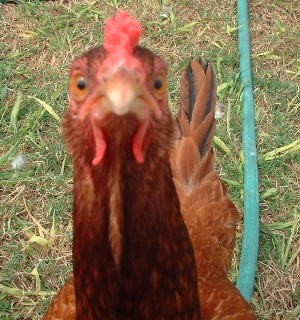 >
>
Jack’s Henhouse
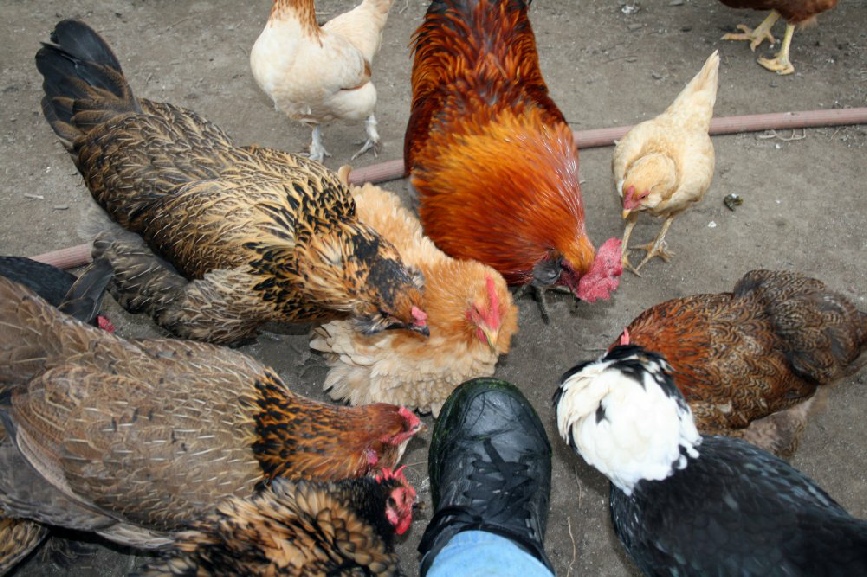 >
>
Jack’s Henhouse
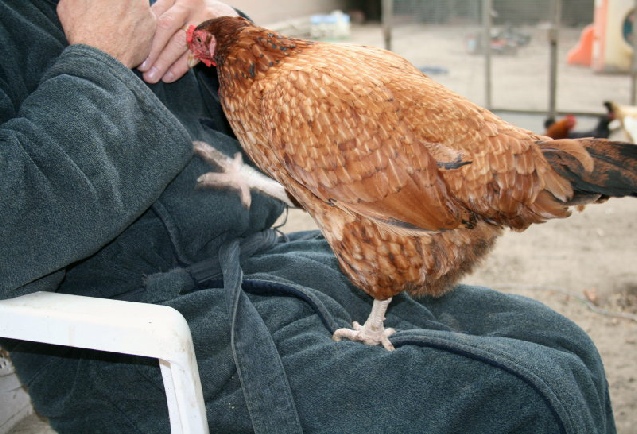 >
>
Jack’s Henhouse
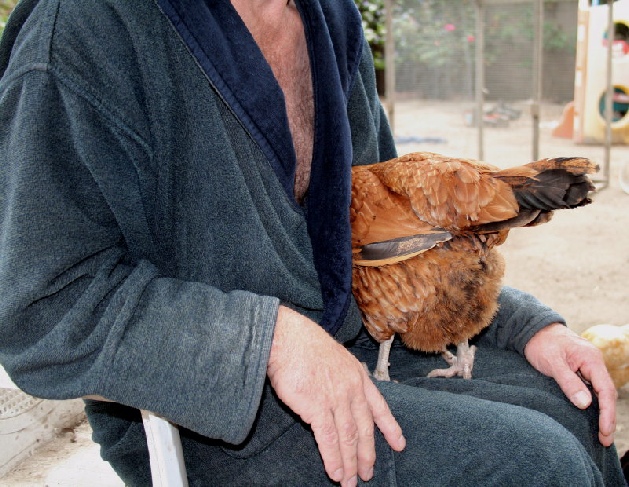 >
>
Jack’s Henhouse
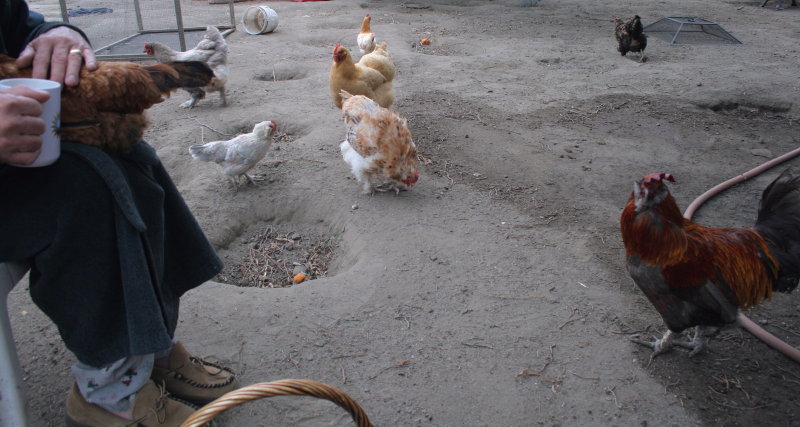 >
>
Jack’s Henhouse
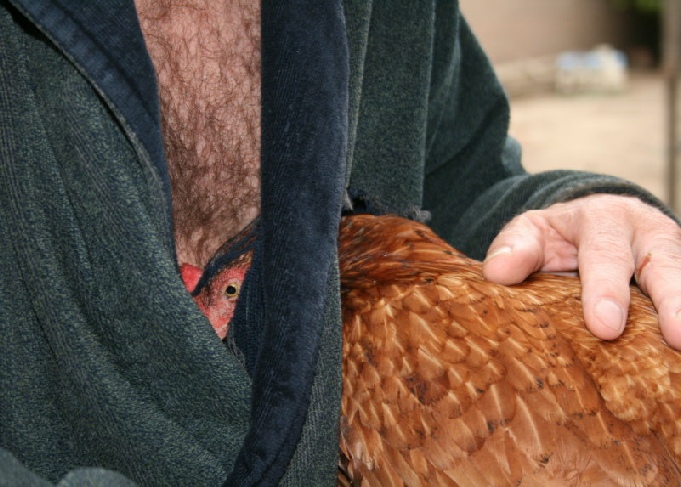 >
>
Jack’s Henhouse
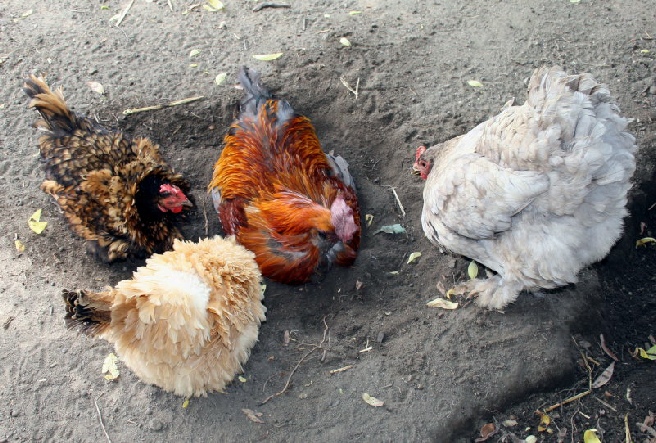 >
>
Jack’s Henhouse
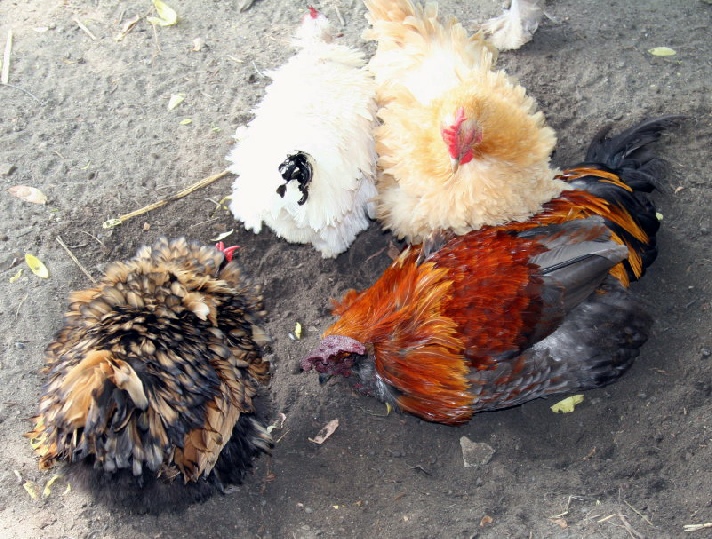 >
>
Jack’s Henhouse
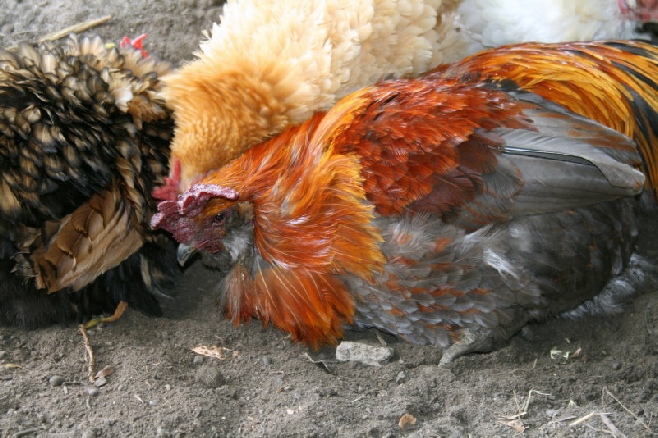 >
>
Jack’s Henhouse
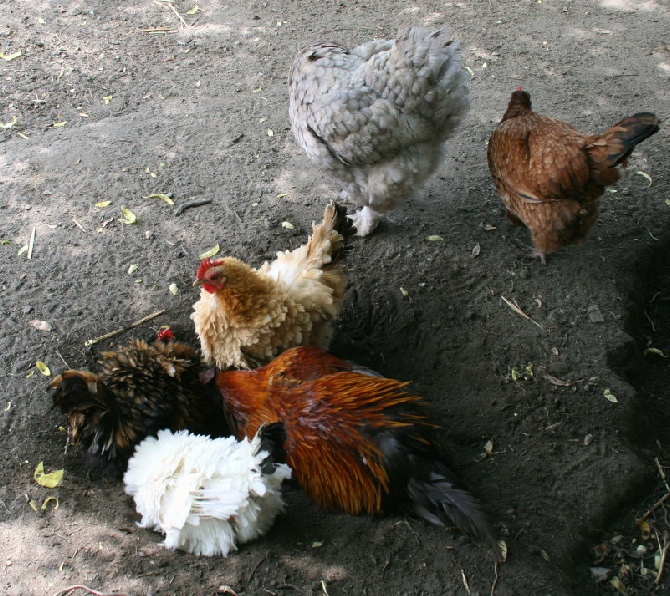 >
>
Jack’s Henhouse

Enjoying the chickens? Has my site helped you?
Want to buy the chickens some goodies?
Click the button!
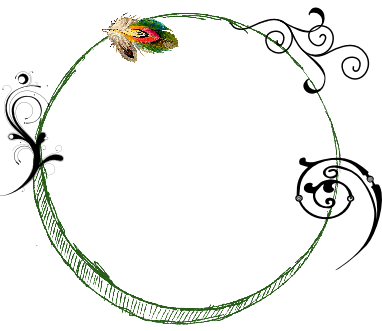

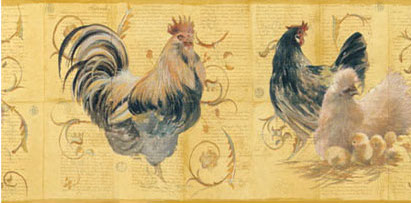
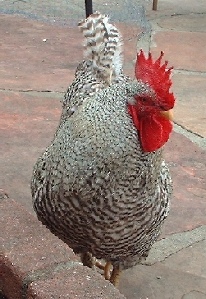 >
>








